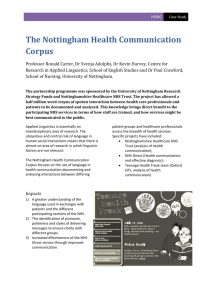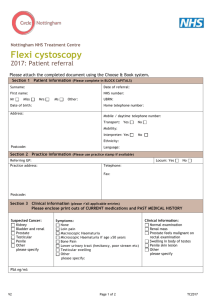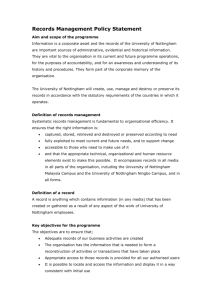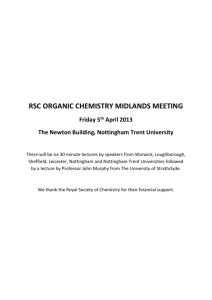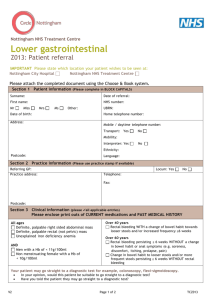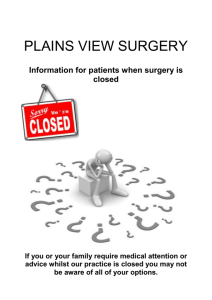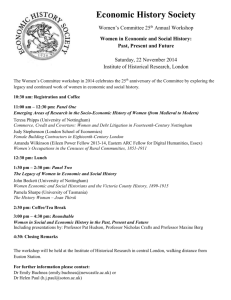THE UNIVERSITY OF NOTTINGHAM RECRUITMENT ROLE
advertisement
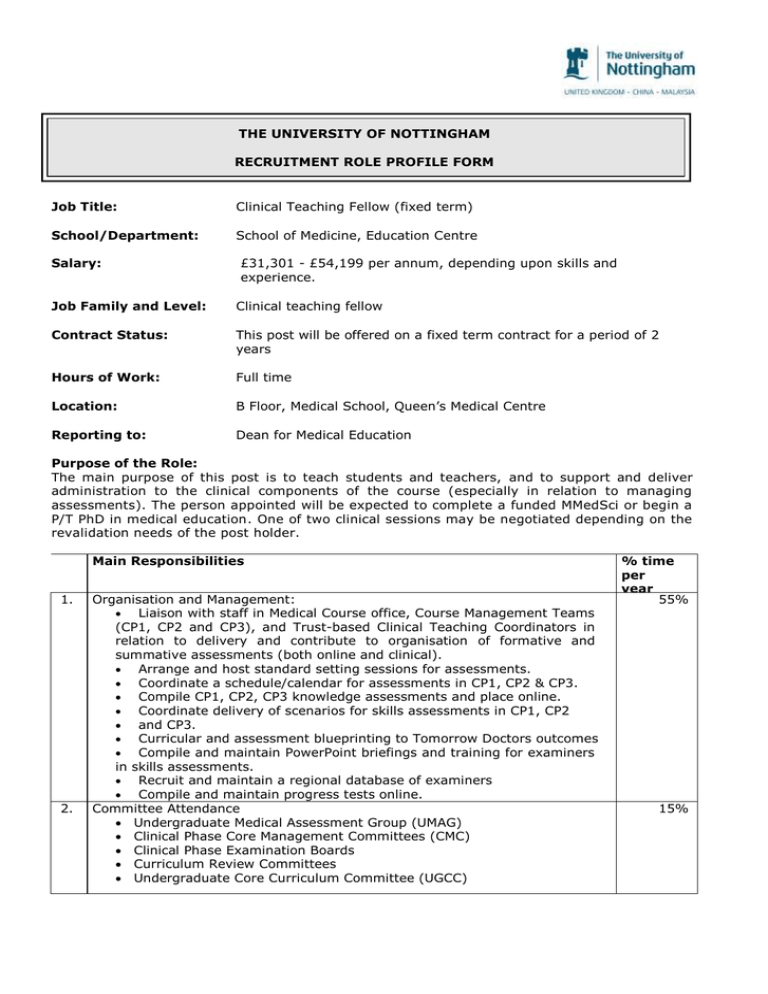
THE UNIVERSITY OF NOTTINGHAM RECRUITMENT ROLE PROFILE FORM Job Title: Clinical Teaching Fellow (fixed term) School/Department: School of Medicine, Education Centre Salary: £31,301 - £54,199 per annum, depending upon skills and experience. Job Family and Level: Clinical teaching fellow Contract Status: This post will be offered on a fixed term contract for a period of 2 years Hours of Work: Full time Location: B Floor, Medical School, Queen’s Medical Centre Reporting to: Dean for Medical Education Purpose of the Role: The main purpose of this post is to teach students and teachers, and to support and deliver administration to the clinical components of the course (especially in relation to managing assessments). The person appointed will be expected to complete a funded MMedSci or begin a P/T PhD in medical education. One of two clinical sessions may be negotiated depending on the revalidation needs of the post holder. Main Responsibilities 1. 2. Organisation and Management: Liaison with staff in Medical Course office, Course Management Teams (CP1, CP2 and CP3), and Trust-based Clinical Teaching Coordinators in relation to delivery and contribute to organisation of formative and summative assessments (both online and clinical). Arrange and host standard setting sessions for assessments. Coordinate a schedule/calendar for assessments in CP1, CP2 & CP3. Compile CP1, CP2, CP3 knowledge assessments and place online. Coordinate delivery of scenarios for skills assessments in CP1, CP2 and CP3. Curricular and assessment blueprinting to Tomorrow Doctors outcomes Compile and maintain PowerPoint briefings and training for examiners in skills assessments. Recruit and maintain a regional database of examiners Compile and maintain progress tests online. Committee Attendance Undergraduate Medical Assessment Group (UMAG) Clinical Phase Core Management Committees (CMC) Clinical Phase Examination Boards Curriculum Review Committees Undergraduate Core Curriculum Committee (UGCC) % time per year 55% 15% 3. 4. 5. Training: Contribute to delivery of examiner training for Assessment (covering assessment questions, standard setting, OSCE) delivered to Clinical Academic and NHS Staff with emphasis on clinical teaching and assessment. Deliver clinical training sessions for medical students in the Skills Centre. Host an annual medical education day for educators in each clinical phase. Two clinical sessions in the specialty of their choice/specialty (one day per week maximum) with emphasis on undergraduate teaching during this time 10% 20% Undertake the MMedSci in Clinical Education (part time) during their two year post or begin a part time PhD. Knowledge, Skills, Qualifications & Experience Qualifications/ Education Skills/Training Experience Statutory/Legal Other Essential Medical Graduate Desirable MD or PhD Understanding of key concepts in undergraduate and postgraduate education. All round computer literacy in a range of packages/areas including MS Office, excel, and access. Good communication and interpersonal skills. Undergraduate and postgraduate education. Completed UK Foundation posts. GMC registered with a license to practise. Satisfactory enhanced disclosure from the Disclosure and Barring Service. Working to tight deadlines. Collaborative working. Willingness to adopt the Ethos and Principles of the School of Medicine to improve the student experience. Knowledge of Tomorrow’s Doctors 2009. Use of IT in medical education. Decision Making i) taken independently by the role holder Preparation for clinical teaching sessions. Assessment question writing (formative and summative). ii) taken in collaboration with others Construction of examination material Liaison with key NHS local education providers in the region Organisation and work of examination moderation meetings iii) referred to the appropriate line manager (please name) by the role holder Decisions regarding overall priorities will be made by the line manager, Dean of Medical Education. 2 Scope of the Role The main areas of responsibility in this post are: 1. Teaching Training in our assessment procedure is mandatory for all those who examine our students. The person appointed will design and deliver this training to examiners. The postholder will undertake weekly clinical skills teaching sessions in our clinical skills centre, under the direction of the Director of Clinical Skills. 2. Administration of clinical phase assessments: The person appointed will carry a significant responsibility in managing and delivering knowledge-based and skills assessments (formative and summative) together with staff in the MEC and Course Management Teams. There also will be an important contribution to quality assurance processes in assessment as a member of the Assessment Unit, overseen by the Director of Examinations and Assessments. 3. Curriculum mapping and assessment blueprinting. 4. Clinical activity: Some clinical work may be undertaken in the specialty area of the person appointed, to enable revalidation, but with an emphasis on undergraduate education. Additional Information The Education Centre is based in the Medical School, Queen's Medical Centre, Nottingham. Partner Trusts are located within the Trent Region of the East Midlands with academic and NHS staff involved in the 5-year medical training programme based in Derby, Mansfield, Lincoln, Boston, Grantham as well as on two sites in Nottingham. A 4-year Graduate Entry medical programme runs alongside and within part of the 5-year programme. The first 18 months of this programme is located in Derby. Informal enquiries may be addressed to Professor Gill Doody, Dean for Medical Education, tel: 0115 823 0025 or email – Gillian.doody@nottingham.ac.uk Please note that applications sent directly to this Email address will not be accepted. Appendix 1 The University of Nottingham The University of Nottingham is a global-leading, research-intensive university with campuses in the UK, Malaysia and China. Our reputation for world-class research has yielded major scientific breakthroughs such as Nobel-winning MRI techniques, drug discovery, food technologies and engineering solutions for future economic, social and cultural progress. Already ranked among the UK’s elite universities and global polls for research excellence, our reputation for world-class research has been further enhanced with the 2014 results of the Research Excellence Framework (REF). In addition to scoring highly in quality rankings covering major disciplines in science, engineering, the social sciences, medicine, business and the arts, it is Nottingham’s research power rankings which demonstrate the impressive volume of excellent research which is carried out. We are now ranked 8th in the UK on a measure of ‘research power’ which takes into account both the quality of research and the number of research-active staff who made REF returns, confirming Nottingham’s place in the top tier of the world’s elite higher education institutions. The main University campus is set beside a lake, in an extensive belt of woodland, parks and playing fields. The 330 acre University Park Campus is the focus of life for more than 32,000 students and houses the majority of the University’s academic schools and many of the central Services. The Jubilee campus is situated 2 miles away from the University Park, and provides extra capacity. The University Medical School is situated next to the University Park. Together with the University Hospital, it forms the Queen’s Medical Centre (QMC). University of Nottingham Medical School Nottingham has a strong reputation for both clinical medicine and teaching. As one of the most popular medical schools in the country, it is able to select excellent students and produce and attract good junior doctors. The School of Medicine was formed following Faculty reconfiguration on August 1st 2013. The new School of Medicine comprises the Divisions of Cancer and Stem Cell Sciences, Child Health, Obstetrics and Gynaecology; Clinical Neuroscience; Epidemiology and Public Health; Primary Care; Psychiatry and Applied Psychology; Rehabilitation and Ageing; Medical Sciences and Graduate Entry Medicine; Respiratory Medicine; Rheumatology, Orthopaedics and Dermatology and the Nottingham Digestive Diseases Centre. The School also hosts the Medical Education Centre, the Centre for Interprofessional Education and Learning, the Clinical Research Facility, the Clinical Skills Centre, NIHR design Service East Midlands, Nottingham Clinical Trials Unit, PRIMIS and Medical Imaging Unit. The new School of Medicine brings together in one School staff undertaking research for the benefit of the health of patients. It includes all primary care and hospital-based medical and surgical disciplines, principally in the Queen’s Medical Centre and City Hospital Nottingham Campuses, Royal Derby Hospitals NHS Foundation Trust and also at the University’s main campus and at the King’s Meadow and Jubilee Campuses. Most of our School’s Senior Researchers and Teachers are also clinicians who dedicate 50% of their time to patient care within the Nottingham University Hospitals NHS Trust & Royal Derby Hospitals NHS Trust. This close juxtaposition brings cuttingedge clinical care to our patients and clinical relevance to our research and teaching. We are closely integrated with our full time NHS clinical colleagues, many of whom are themselves leaders in research and teaching and who work closely with the University and this increases the mutual benefit from integration between the University and NHS. Mission: Our mission is to improve human health and quality of life locally, nationally and internationally through outstanding education, research and patient care. Priorities: 1. Teaching and learning, particularly training tomorrow’s doctors and teaching specialised postgraduates 2. Research and research training: We will perform and support the highest quality “big” research which impacts on human health and disease 3. Partnership with the NHS and other healthcare providers 4. Visibility and profile of the School of Medicine: We will do what we do better, and we will tell others about it Ethos and principles: 1. Having people and patients at the heart of all we do: our teaching and learning, our research and our patient care 2. Contribution within the School of Medicine and to society beyond our immediate roles; helpfulness and service 3. Openness and fairness, with particular emphasis on communication (both internal and external) and on equality and diversity among students and staff 4. Personal and group responsibility for all aspects of our work, within a culture of opportunity and reward Our research spans 11 major themes, ranging from cancer to vascular medicine. We work closely with industry and the NHS. Our world-leading research ranges from basic and translational science through to clinical trials, epidemiology, and health services research. Our clear theme is improving human health, underpinning a vibrant postgraduate research training programme leading to PhD or DM. Many of our academics are clinicians, using their expertise to provide cutting edge specialised treatment to NHS patients; reflecting our ethos that patients are at the heart of all we do. In the 2014 Research Excellence Framework the four Units of Assessment included in the School of Medicine were among the six most improved in the whole University since RAE 2008: Over 80% of our research in 2014 was graded as world-leading or internationally excellent. Our research spans 11 major themes and ranges from basic and translational science through to clinical trials, epidemiology, and health services research. We work closely with industry and the NHS. Our research is underpinned by a strong postgraduate research training programme leading to PhD or DM. Our major research themes are in Cancer and Stem Cells; Child Health, Obstetrics & Gynaecology; Clinical Neurosciences; Dermatology; Digestive Diseases; Epidemiology and Public Health; Mental Health; Musculoskeletal physiology and disease; Primary Care; Rehabilitation and Ageing; Respiratory Medicine; and Renal Medicine. The School of Medicine trains tomorrow’s doctors on a vibrant undergraduate medical course with a unique intercalated BMedSci, as well in a specialised graduate-entry programme built around clinical problem solving. We teach medicine and related disciplines at both undergraduate and postgraduate level. We have a dedicated clinical academic training programme and are committed to training PhD and doctoral research students and to supporting postdoctoral clinicians and scientists in their research. The School of Medicine holds a Bronze Athena SWAN award in recognition of our commitment to advance the representation of women in science, technology, engineering, medicine and mathematics (STEMM). The award reflects our commitment to promoting equality and diversity. Please see http://www.nottingham.ac.uk/medicine/about/athena-swan.aspx. Professor Tony Avery is Dean of the School of Medicine. For further information, please see our website http://www.nottingham.ac.uk/medicine Nottingham Central within the East Midlands, Nottingham is a vibrant and prosperous city with something to offer everyone. It is one of the UK’s leading retail centres and has a huge variety of restaurants, bars and nightclubs which attract people from all over the UK. Culturally, it has good theatres, an arena which attracts both national and international performers and a range of historical interests relating to subjects such as the lace industry, Lord Byron and DH Lawrence. Nottingham is also known for sport, being the home of Trent Bridge Cricket Ground, Nottingham Forest and Notts County Football Clubs, the National Water Sports Centre and the Nottingham Tennis Centre. There is a good network of roads with easy access to the M1 and the A1, a fast frequent rail service to London and other major cities. Nottingham East Midlands Airport is only eighteen miles away. The city is set within a county of outstanding natural beauty which includes Sherwood Forest, Wollaton Park, lively market towns and wonderful historic buildings. Housing is relatively inexpensive and, in addition to the two Universities, there are excellent schools and colleges available. To find out more about Nottingham, use the following links: Nottingham County Council – Tourism http://www.experiencenottinghamshire.com/ University of Nottingham http://www.nottingham.ac.uk Zoopla (Guide to local properties) http://www.zoopla.co.uk/ My Nottingham (information on schools, term dates, school transport etc.) http://www.nottinghamcity.gov.uk/index.aspx?articleid=8524 Comprising of four schools (School of Health Sciences, School of Life Sciences, School of Medicine and the School of Veterinary Medicine and Science) we undertake research across the full range of health and basic sciences. Overall we teach around 6,000 undergraduate and 900 postgraduate taught students, with our courses being recognised for their innovative and exemplary teaching. Our wide ranging research covers areas from basic sciences to clinical translational research. Vision Our vision is to deliver world leading research and inspirational teaching for tomorrow’s scientists, doctors, nurses, midwives, physiotherapists and veterinarians. We will achieve this via our: excellent links with industry and the NHS talented people – working and learning in a vibrant and supportive academic community commitment to inspirational teaching outstanding environment and facilities advanced research facilities and associated expertise to underpin cutting-edge research Teaching Our teaching strategy is to develop graduates who have a thorough grounding in their subject of study, are aware of research, have a critical approach to knowledge, can study independently and have the skills and attributes to be successful in employment. We are particularly keen to ensure that our students have a well-balanced programme of lectures, small group teaching, tutorials and seminars. Laboratory and practical work are intrinsic parts of our undergraduate degrees and are highly valued and enjoyed by our students. Research Our wide ranging research covers areas from basic sciences to clinical translational research in which we currently supervise 800 postgraduate research students and undertake research of £43 million per annum. The faculty provides advanced research facilities and associated expertise to underpin cutting-edge research. These include next generation high throughput gene sequencing and bioinformatics support, high content screening for drug discovery, and a wide range of imaging modalities such as MRI and PET CTs, for human and advanced animal research. The dedicated Clinical Trials Unit and Clinical Research Facility are funded in partnership with Nottingham University Hospitals NHS Trust. The faculty’s research platforms make important contributions in four of the University’s Research and Knowledge Transfer Strategic Priority Areas: • Biomedical Imaging • Clinical Translational Research • Drug Discovery • Global Food Security NHS Partnerships The work we do depends on strong and effective partnerships with organisations in the East Midlands. In establishing the new Faculty of Medicine and Health Sciences we aim to make our partnerships with the NHS even stronger so that our collective research and education activities deliver the greatest benefits for patients and the public. Key Facts Around 1,700 faculty staff including 1,000 academics • Over 5,000 students including 3,652 undergraduates (7% international) • 818 postgraduate taught masters students (22% international) • 810 research students • Total research portfolio in excess of £140 million • Attracted £37.3 million in new awards in 2012-13 • 328 live research projects (2012-13)
